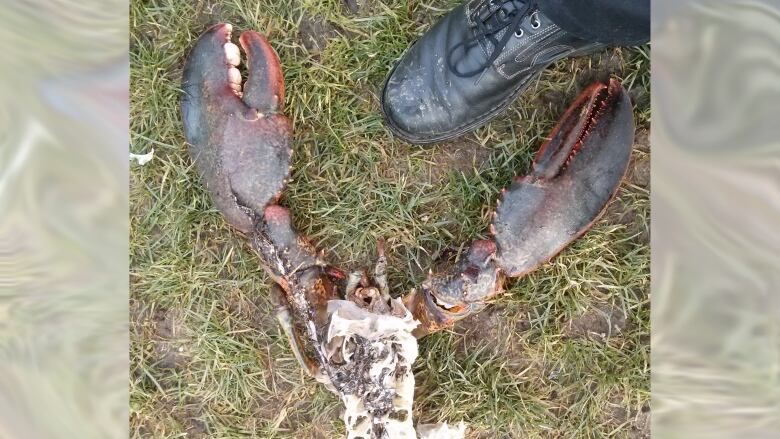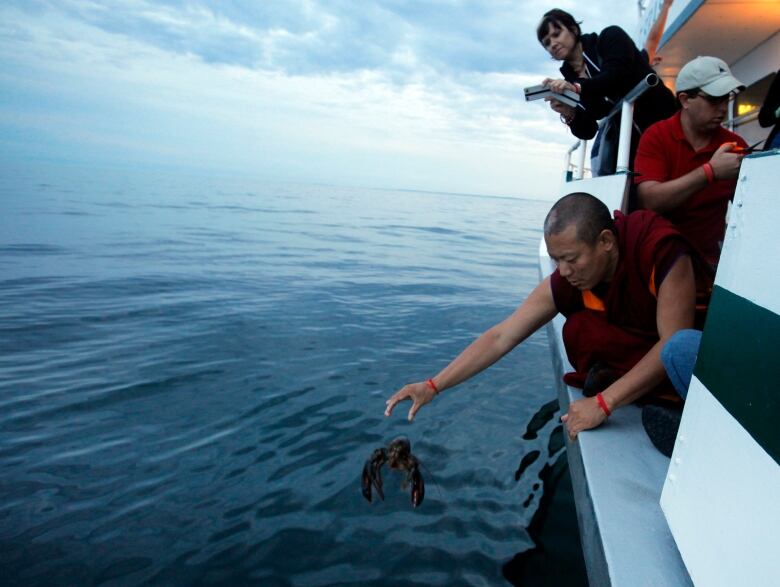'Huge' Atlantic lobster washed up in Vancouver likely set free by animal lovers
Alien lobster with claws almost as big as a man's shoe may have been cruising the Pacific for some time

It's certainly not a typical sight on Vancouver beaches,or anywhere on the West Coast, in fact:The carcass of a large lobster, native to the Atlantic Ocean, with claws almost as big as a man's size 11 shoe.
"I saw it from far away, and thought, 'Wow, that's a lobster,'" said Damon Gudaitis, who spotted a dog walker pick it from the surf while walking in New Brighton Park in East Vancouver last week.
Gudaitis,curious what the alien crustacean was doing there, snapped a picture of the lobsterand sent it to Fisheries and Oceans Canada. He didn't hear back, but local biologists have offered a likely explanation.
And before you break out the garlic butter, it doesn't appear to be a human meal thrown overboard: cooked lobster turns bright red, and the huge claws which hold tasty meat were left intact.
Buy and release
We showed the picture to Chris Harley, a marine ecologist at the University of B.C., who said Atlantic lobsters turn up in the Pacific from time to time. One, for instance,was caught off Bowen Island thatbecame aminor media sensation in 2014.
Then, as now, Harley said, the lobster likely crossed the country destined for a dinner plate.
"It was almost certainly brought over live through the live seafood trade for restaurants or the seafood markets," said Harley.
"People will buy live seafood, including lobsters, and then through what they think is an act of kindness, release it into the wild here in Vancouver."
Harley was struck by how big this particular one is,larger than what's normally seen in a live fish tank at the store.
"Those claws are pretty huge," he said. "That suggests that if someone bought it in a store and released it ... then it may have been cruising around for quite a while to grow that big."

Buddhist ceremony?
Though anyone could be behind such an act, Buddhist monks have been known to free lobsters including a ceremonial release of hundreds in Massachusetts in 2011.
However, the resident minister at the Vancouver Buddhist Temple, Tatsuya Aoki, said he hadnever heard of that happening.
Danny Kent, curator of B.C. waters at the Vancouver Aquarium, said people call to ask about liberating lobsters.
"In my time at the aquarium, which is the last 25 years, I've had calls from just average citizens who want to release them," said Kent. A group of Buddhists also called more than a decade ago, he said.
"They ask me if it's a good idea and I told them no."
It's also illegal under federal fisheries law.
Buddhist monk Zhihan, who grew up in Vancouver, said freeing animals is a practice going back 2,000 years but he doesn't recommend it.
"As Buddhists we treasure life, so whenever we see beings suffering, or about to be killed, then we try to save them."
Zhihan said he hasn't participated in the ritualsand tells his students not to because it could "disrupt the ecological balance.
"I try to tell them that it's better to just eat less meat."
Alien invaders
There have been decades of attempts to introduce Atlantic lobster to the Pacific, including federal government programs tossing thousands into the ocean as far back as the 1950s, but none hasseemed to take, said Harley.
Still, that's no reason to think tossing a live, alien species into local waters is a benign act.
"It's a bad idea to introduce any animal that's not native to an area," said Kent.
A powerful predator like a lobster could eat other animals, eat other animals' food, and introduce parasites or diseases from a foreign ocean.
Plus, said Harley, scientists know from other introductions like the now omnipresent European starling that it can take 10tries before an alien species takes off.
"You never know which lobster you add thatbecomes the important one."
With files from Matthew McFarlane












_(720p).jpg)


 OFFICIAL HD MUSIC VIDEO.jpg)
.jpg)



























































































